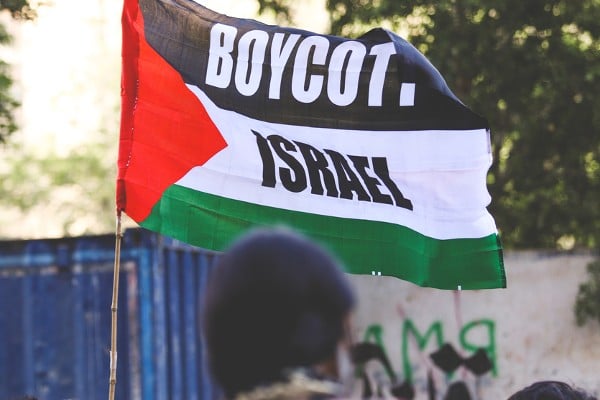University of California-Los Angeles denounced the resolution for transgressing school policy and the spirit of academic freedom.
By Dion J. Pierre, The Algemeiner
The University of California-Los Angeles student government on Tuesday passed a resolution endorsing the boycott, divestment, and sanctions (BDS) movement, as well as false accusation that Israel is committing genocide against Palestinians in Gaza.
“The Israeli government has carried out a genocidal bombing campaign and ground invasion against Palestinians in Gaza — intentionally targeting hospitals universities, schools, shelters, churches, mosques, homes, neighborhoods, refugee camps, ambulances, medical personnel, [United Nations] workers, journalists and more.”
The resolution, passed 10-3 by the UCLA Undergraduate Student Association Council (USAC), says, not mentioning that UN personnel in Gaza assisted Hamas’ massacre across southern Israel on Oct. 7.
It continued, “Let it be resolved that the Undergraduate Student Association of UCLA formally call upon the UC Regents to withdraw investments in securities, endowments mutual funds, and other monetary instruments….providing material assistance to the commission or maintenance of flagrant violations of international law.
The days leading up to the vote were fraught, The Daily Bruin, the university’s official student newspaper reported on Wednesday.
“Non-UCLA students” sent USAC council members emails imploring them to vote for or against the resolution and USAC Cultural Affairs Commissioner and sponsor of the resolution, Alicia Verdugo, was accused of antisemitism and conduct warranting impeachment.
The UCLA Graduate Student Association and University of California-Davis’ student government had just endorsed BDS the previous week, prompting fervent anticipation for the outcome of Tuesday’s USAC session.
Before voting took place, members of the council ordered a secret ballot, withholding from their constituents a record of where they stood on an issue of monumental importance to the campus culture.
According to The Daily Bruin, they expressed “concerns” about “privacy” and “security.” Some members intimated how they would vote, however.
During a question and answer period, one student who co-sponsored the resolution accused a Jewish student of being “classist” and using “coded” language.
She argued that the council had advanced the resolution without fully appreciating the complexity of the Israeli-Palestinian conflict and the history of antisemitism.
“As a Guatemalan, …my country went through genocide,” he snapped at the young woman, The Daily Bruin’s reporting documented. “My family died in the Guatemalan Mayan genocide. I understand. I very well know what genocide looks like.”
Other council members voiced their support by co-sponsoring the resolution, which was co-authored by Students for Justice in Palestine (SJP), a group that has held unauthorized demonstrations and terrorized Jewish students across the country.
Responding to USAC’s decision, Jewish students told the paper that they find the campaign for BDS and the attempts of pro-Palestinian students to defend Hamas’ atrocities myopic and offensive.
“How can anyone dare to contextualize since Oct. 7 without acknowledging that the Jewish people are victims of such a cataclysmic attack?” Mikayla Weinhouse said. “BDS intentionally aims to divide a community. Its supporters paint a complex and century-old conflict in the Middle East as a simplistic narrative that inspires hate rather than advocates for a solution.”
University of California-Los Angeles denounced the resolution for transgressing school policy and the spirit of academic freedom.
“The University of California and UCLA, which, like all nine other UC campuses, has consistently opposed calls for a boycott against and divestment from Israel,” the school said in a statement. “We stand firm in our conviction that a boycott of this sort poses a direct and serious threat to the academic freedom of our students and faculty and to the unfettered exchange of ideas and perspectives on this campus.”





